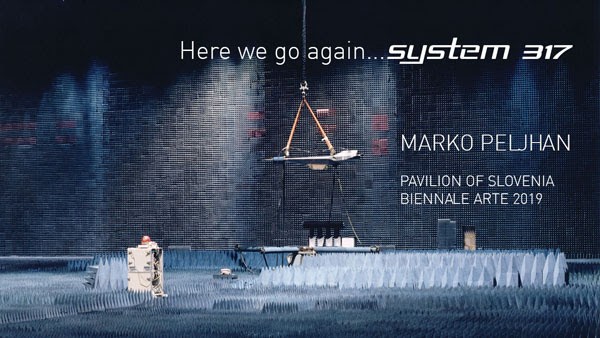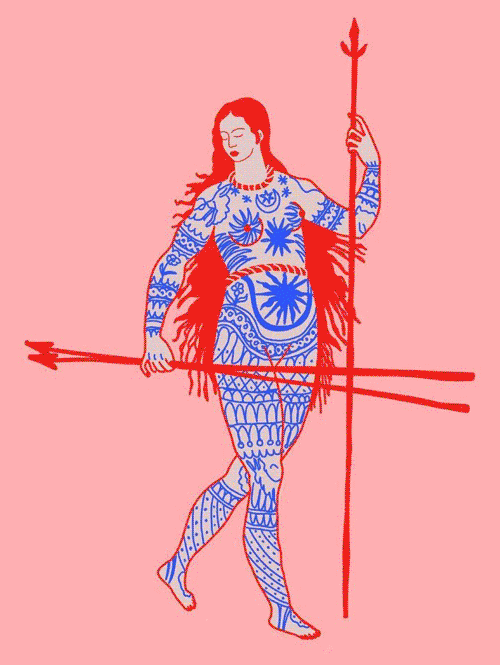Create an account
Welcome! Register for an account
La password verrà inviata via email.
Recupero della password
Recupera la tua password
La password verrà inviata via email.
-
- container colonna1
- Categorie
- #iorestoacasa
- Agenda
- Archeologia
- Architettura
- Arte antica
- Arte contemporanea
- Arte moderna
- Arti performative
- Attualità
- Bandi e concorsi
- Beni culturali
- Cinema
- Contest
- Danza
- Design
- Diritto
- Eventi
- Fiere e manifestazioni
- Film e serie tv
- Formazione
- Fotografia
- Libri ed editoria
- Mercato
- MIC Ministero della Cultura
- Moda
- Musei
- Musica
- Opening
- Personaggi
- Politica e opinioni
- Street Art
- Teatro
- Viaggi
- Categorie
- container colonna2
- container colonna1
58. Biennale – Padiglione Slovenia: Marko Peljhan – Here we go again…SYSTEM 317
Per il padiglione della Slovenia, Here we go again…SYSTEM 317 di Marko Peljhan
Comunicato stampa
Segnala l'evento
Opening: May 8, 2019 at 4.00 PM
Dates: From May 11 to November 24, 2019
Press conference: April 18, 2019 at 11:00 am, at Moderna galerija, Ljubljana
Location of the exhibition: Arsenale, Artiglierie in Venice
Commissioner: Zdenka Badovinac
Curator: Igor Španjol
Production: Moderna galerija and Zavod Projekt Atol, Ljubljana
Marko Peljhan is an artist and researcher working in and between art, technology and science. His projects, initiatives, and collaborations span a vast area ranging from ecology and social reflection to tactical media, technology, space exploration and geopolitics. In his poetic and strategic actions he frequently employs materials and methods that serve to confront systems of governance and the strategies they employ. His work revolves around the technological developments in communication, transport, and surveillance, and the highly complex systems of political, economic, and military power driving such developments and employing them in administration, control, production or military applications. Peljhan’s art has evolved into a process involving a cartography of the invisible and the overlooked, and an analysis of the role of technology in society, particularly as it relates to power structures. It opens up a process of reflection on the possibilities of a different, creative and resistant use of technology and proposes the creation of socially useful models of resistant behaviors in the contemporary social system. The artist brings a great deal of historical awareness to his work, remaining at the same time loyal to values integral to notions of artistic and technological avant-gardism. He is constantly aware of the position from which he acts, of his moral standpoints, and of the consequences such artistic involvement entails. He is critical of the social and cultural impact and role of the media he uses in his work, and translates his critical attitude into concrete actions. Crucial to such an approach is a clearly articulated understanding of what he is resisting and the relation between his tactical and strategic goals.
At the 58th International Art Exhibition – La Biennale di Venezia, Peljhan will present a new work from his Resolution series. This series, which has evolved over some 20 years, proposes some specific material and applicable solutions to certain problems in society. It is the artist’s response to the state in which the world finds itself today, calling for a rediscovery of space and of the place, the physical location of an individual, and a utopian response to the rapid changes in the environment. In this sense, the autonomous vessel SYSTEM 317 is a colonizing, apocalyptic and pirating tool of sorts. In it, Peljhan brings together his vision, the potential for and the impossibility of a final exit from our rapidly deteriorating planetary conditions in a process he calls “reverse conversion”. He first employed this methodology in his TRUST-SYSTEM series, which focused on the conversion of cruise missile technology and later, unmanned systems for civil counter-reconnaissance. Underpinning all of these projects is the idea of using available military technology to develop the tactical means required to execute his ventures. The artist proposes the construction of a counter-privateering machine intended for the days when the world’s great empires find themselves, once again, in confrontation – and one characterized by a grave lack of responsibility together with great destructive potential.
Marko Peljhan (1969) founded the non-profit art institution Projekt Atol in 1994, and was a co-founder of the Ljubljana-based new-media laboratory Ljudmila a year later. He first presented one of his best-known projects, Makrolab, at Documenta 10 in Kassel in 1997 and at the 50th International Art Exhibition of La Biennale di Venezia in 2003. Over the past 25 years his work has been exhibited and won awards internationally at multiple biennials and festivals (Venice, Gwangju, Brussels, Manifesta, Johannesburg, Istanbul), at several ISEA exhibitions, several Ars Electronica presentations and in major museums, including MoMA PS1, New Museum of Contemporary Art, ICC NTT Tokyo, YCAM Yamaguchi, Van Abbemuseum in Eindhoven, and the Garage Museum in Moscow, among others. He was the first Slovene artist to win the Golden Nica prize at Ars Electronica in 2001 for the polar project, produced together with the German artist Carsten Nicolai. In collaboration with American-Canadian artist Matthew Biederman Peljhan has also been coordinating the Arctic Perspective Initiative since 2008, an art/science/tactical media project focused on the global significance of the Arctic’s geopolitical, natural and cultural spheres, and presented at their exhibition Coded Utopia in Moderna galerija in Ljubljana in 2011. In addition, Peljhan also works as Professor at the University of California Santa Barbara, holding joint appointments with the Department of Art and the Media Arts & Technology graduate program. He has been a board member and international coordinator of the SPACE-SI Centre of Excellence for Space Sciences and Technologies in Slovenia, and has been actively involved in space and aeronautics research and space culturization since 1998. In the radio spectrum he is known as S54MX.
Dates: From May 11 to November 24, 2019
Press conference: April 18, 2019 at 11:00 am, at Moderna galerija, Ljubljana
Location of the exhibition: Arsenale, Artiglierie in Venice
Commissioner: Zdenka Badovinac
Curator: Igor Španjol
Production: Moderna galerija and Zavod Projekt Atol, Ljubljana
Marko Peljhan is an artist and researcher working in and between art, technology and science. His projects, initiatives, and collaborations span a vast area ranging from ecology and social reflection to tactical media, technology, space exploration and geopolitics. In his poetic and strategic actions he frequently employs materials and methods that serve to confront systems of governance and the strategies they employ. His work revolves around the technological developments in communication, transport, and surveillance, and the highly complex systems of political, economic, and military power driving such developments and employing them in administration, control, production or military applications. Peljhan’s art has evolved into a process involving a cartography of the invisible and the overlooked, and an analysis of the role of technology in society, particularly as it relates to power structures. It opens up a process of reflection on the possibilities of a different, creative and resistant use of technology and proposes the creation of socially useful models of resistant behaviors in the contemporary social system. The artist brings a great deal of historical awareness to his work, remaining at the same time loyal to values integral to notions of artistic and technological avant-gardism. He is constantly aware of the position from which he acts, of his moral standpoints, and of the consequences such artistic involvement entails. He is critical of the social and cultural impact and role of the media he uses in his work, and translates his critical attitude into concrete actions. Crucial to such an approach is a clearly articulated understanding of what he is resisting and the relation between his tactical and strategic goals.
At the 58th International Art Exhibition – La Biennale di Venezia, Peljhan will present a new work from his Resolution series. This series, which has evolved over some 20 years, proposes some specific material and applicable solutions to certain problems in society. It is the artist’s response to the state in which the world finds itself today, calling for a rediscovery of space and of the place, the physical location of an individual, and a utopian response to the rapid changes in the environment. In this sense, the autonomous vessel SYSTEM 317 is a colonizing, apocalyptic and pirating tool of sorts. In it, Peljhan brings together his vision, the potential for and the impossibility of a final exit from our rapidly deteriorating planetary conditions in a process he calls “reverse conversion”. He first employed this methodology in his TRUST-SYSTEM series, which focused on the conversion of cruise missile technology and later, unmanned systems for civil counter-reconnaissance. Underpinning all of these projects is the idea of using available military technology to develop the tactical means required to execute his ventures. The artist proposes the construction of a counter-privateering machine intended for the days when the world’s great empires find themselves, once again, in confrontation – and one characterized by a grave lack of responsibility together with great destructive potential.
Marko Peljhan (1969) founded the non-profit art institution Projekt Atol in 1994, and was a co-founder of the Ljubljana-based new-media laboratory Ljudmila a year later. He first presented one of his best-known projects, Makrolab, at Documenta 10 in Kassel in 1997 and at the 50th International Art Exhibition of La Biennale di Venezia in 2003. Over the past 25 years his work has been exhibited and won awards internationally at multiple biennials and festivals (Venice, Gwangju, Brussels, Manifesta, Johannesburg, Istanbul), at several ISEA exhibitions, several Ars Electronica presentations and in major museums, including MoMA PS1, New Museum of Contemporary Art, ICC NTT Tokyo, YCAM Yamaguchi, Van Abbemuseum in Eindhoven, and the Garage Museum in Moscow, among others. He was the first Slovene artist to win the Golden Nica prize at Ars Electronica in 2001 for the polar project, produced together with the German artist Carsten Nicolai. In collaboration with American-Canadian artist Matthew Biederman Peljhan has also been coordinating the Arctic Perspective Initiative since 2008, an art/science/tactical media project focused on the global significance of the Arctic’s geopolitical, natural and cultural spheres, and presented at their exhibition Coded Utopia in Moderna galerija in Ljubljana in 2011. In addition, Peljhan also works as Professor at the University of California Santa Barbara, holding joint appointments with the Department of Art and the Media Arts & Technology graduate program. He has been a board member and international coordinator of the SPACE-SI Centre of Excellence for Space Sciences and Technologies in Slovenia, and has been actively involved in space and aeronautics research and space culturization since 1998. In the radio spectrum he is known as S54MX.
08
maggio 2019
58. Biennale – Padiglione Slovenia: Marko Peljhan – Here we go again…SYSTEM 317
Dall'otto maggio al 24 novembre 2019
arte contemporanea
Location
ARSENALE
Venezia, Campo Della Tana (Castello), (Venezia)
Venezia, Campo Della Tana (Castello), (Venezia)
Vernissage
8 Maggio 2019, h 16
Autore
Curatore









